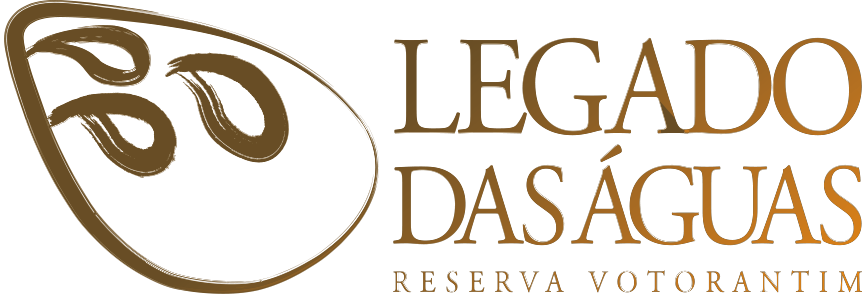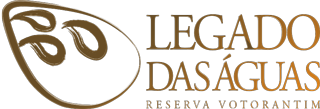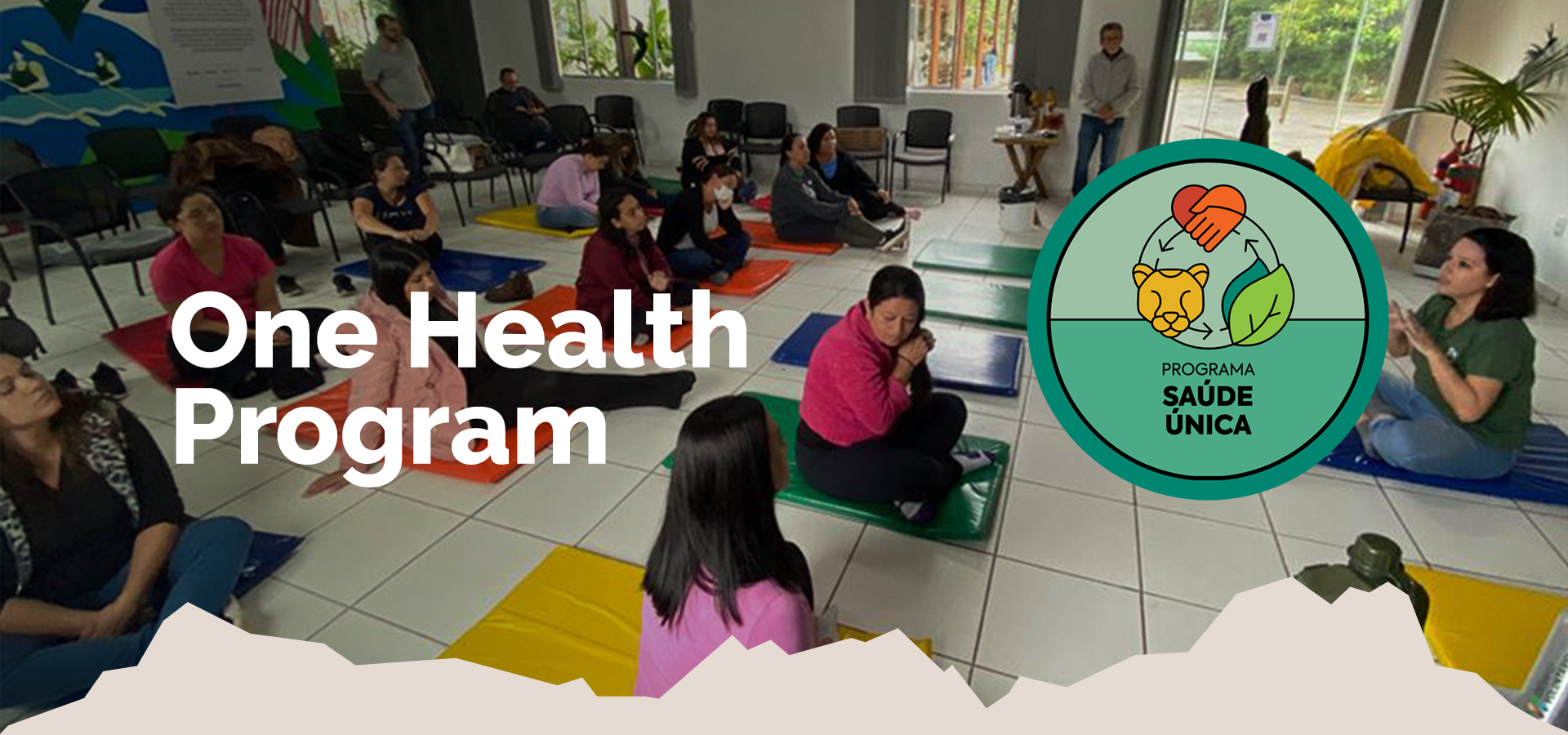
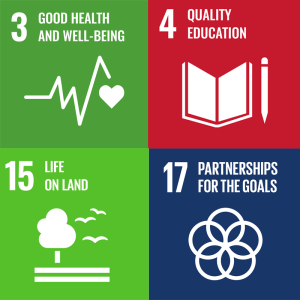
In 2021, Legado das Águas launched the Unique Health Program (PSU) to public health in the Vale do Ribeira, creating bridges between the population, health teams, wildlife and the environment.
Built in partnership with researchers from the Butantan Institute, Faculdade de Medicina do ABC and Universidade Santo Amaro, the program’s principle is to build a network of partners with technical capacity to share knowledge about the one health concept.
The One Health concept, institutionalized by the World Health Organization (WHO), considers that human health and animal health – including domestic and wild animals – are interdependent and linked to the health of ecosystems. This principle is fundamental for the control and prevention of numerous diseases, which occur mainly in areas where the population is more vulnerable, as they live with limited access to health services and basic sanitation.
Through the PSU, in addition to the technical knowledge of the research partners, all the results generated by the research carried out in the Legado das Águas area will be shared with the municipalities of Vale do Ribeira with the aim of promoting training and educational activities for health professionals. The program is currently active in the municipalities of Tapiraí and Juquiá. To follow the program’s actions and other initiatives, follow us on Instagram!
Are you interested in joining the program, collaborating in actions and taking your research to the local communities of Vale do Ribeira? Write to bianca.matinata@legadodasaguas.com.br.
In 2021, Legado das Águas launched the Unique Health Program (PSU) to public health in the Vale do Ribeira, creating bridges between the population, health teams, wildlife and the environment.
Built in partnership with researchers from the Butantan Institute, Faculdade de Medicina do ABC and Universidade Santo Amaro, the program’s principle is to build a network of partners with technical capacity to share knowledge about the one health concept.

The One Health concept, institutionalized by the World Health Organization (WHO), considers that human health and animal health – including domestic and wild animals – are interdependent and linked to the health of ecosystems. This principle is fundamental for the control and prevention of numerous diseases, which occur mainly in areas where the population is more vulnerable, as they live with limited access to health services and basic sanitation.
Through the PSU, in addition to the technical knowledge of the research partners, all the results generated by the research carried out in the Legado das Águas area will be shared with the municipalities of Vale do Ribeira with the aim of promoting training and educational activities for health professionals. The program is currently active in the municipalities of Tapiraí and Juquiá. To follow the program’s actions and other initiatives, follow us on Instagram!
Are you interested in joining the program, collaborating in actions and taking your research to the local communities of Vale do Ribeira? Write to bianca.matinata@legadodasaguas.com.br.
KNOW OUR PARTNERS
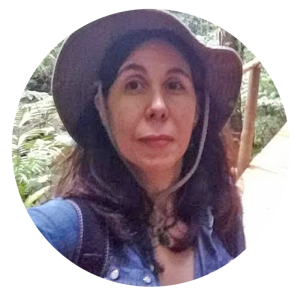
Ana Maria Ribeiro de Castro Duarte
Biologist, researcher at the Pasteur Institute/Secretary of State for Health and Collaborating Researcher at the Institute of Tropical Medicine of São Paulo (IMT/FMUSP). At Legado das Águas, he was part of the project “Biodiversity of plasmodia and mosquitoes in the Legado das Águas Reserve”.
“The actions carried out in the Single Health Program (PSU) in 2022 reflected the importance of exchanging knowledge and experiences between health professionals in the municipality of Tapiraí, scientific researchers and the Legado das Águas team.
Throughout the year it was possible for us to be together in experiences, lectures and practical activities, for example, the collection of mosquitoes and the collection of samples of wild animals for studies of zoonoses, and with this approach important discussions about the health of people, animals and forests of the Atlantic Forest Biome.
The idea is that we can build together, step by step, integrated forms of health education and environmental education actions.
All and all hand in hand, with the will to contribute in the best possible way, to the promotion of health and the preservation of the Environment, and also with the challenge of extending this USP experience to other municipalities around the Legado das Águas Reserve.
Embracing people, animals, forest and water!”
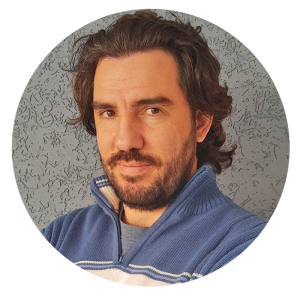
Gabriel Zorello Laporta
PhD in Public Health from the University of São Paulo. At Legado das Águas, he coordinated the project “Biodiversity of plasmodia and mosquitoes in the Legado das Águas Reserve”.
“We started the Unique Health Program (PSU) in the first half of 2021, focusing on our research project “Biodiversity of Plasmodia (…)” to generate informative content about malaria in the Atlantic Forest.
Later, we did a practical activity in November 2021: we received a visit from health professionals from Tapiraí so that they could learn about our field collection at Legado das Águas. We carried out a collection of mosquitoes on the Cambuci Trail so that they could understand how to collect mosquitoes from nature. It was almost like going on a fishing trip! They used instruments and equipment to capture mosquito larvae and adults. They used entomological shells to capture larvae in Poço das Antas. Along the suspended trail they used battery vacuum cleaners and nets to collect adult mosquitoes that flew over our heads. We talked about various subjects. In one of them, we talked about school children from Tapiraí, who would have enjoyed ‘fishing’ for mosquitoes in the Legado.
In order to bring new perspectives to the Program, we invited my parents José Luís Laporta and Márcia Zorello Laporta, professors at Centro Universitário Fundação Santo André, to give lectures at the SEBRAE headquarters, in Tapiraí, in September 2022. The SEBRAE room was full of human warmth from the health agents of Tapiraí. They were eager to answer important questions about the transmission of zoonoses, types of insect vectors, the nature of bats and other discussions about interactions with nature. My father lectured on bats, kissing bugs and insects in general, and my mother lectured on types of bacteria, protozoa and other microorganisms. After their speeches, they were followed by a barrage of questions. There were some health workers who were so excited about their new knowledge that they wanted to study more. My parents made the suggestion to take them to laboratory activities at the Foundation. Will they be surprised to see living cells under the microscope? Sharing knowledge within the Unique Health Program reveals a special feeling. Useful for society is citizen science!”
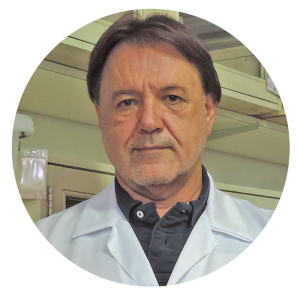
Giuseppe Puorto
Scientific researcher at the Butantan Institute and Director of the Cultural Development Center and the Biological Museum. At Legado das Águas, he coordinates the project “Survey of herpetofauna and scientific dissemination”.
“Since the beginning of our activity at Legado da Águas, in 2016, with the proposal of “Herpetofauna Survey and Scientific Dissemination”, we have been working on the concepts of One Health / Citizen Science, both for the Legado teams and in different surrounding municipalities. . This work has always been fully aligned and organized with Elaine Moura from the Environmental Education Program, as they are completely complementary subjects. During this period, lectures, courses, training for the team and external staff and workshops were held according to the profile of each group.
With the implementation of the Single Health Program (PSU), as an integrative proposal of Legado das Águas to the municipalities, we were invited and promptly agreed to participate, focusing on our area of expertise and project on herpetofauna (reptiles and amphibians) as a way of generate informative content about the preserved area of the Atlantic Forest.
Since the beginning of the PSU Program, online lectures have been held during the restrictive phase of the pandemic and, as the situation came under control, we held face-to-face lectures in Tapiraí.
The actions of Instituto Butantan, in relation to venomous animals, have been taking place since its creation in 1901. Together with Legado das Águas, we continue with these actions, marking the regional presence of two large entities.”
NOSSAS AÇÕES
© 2023 – Legado das Águas • All rights reserved
